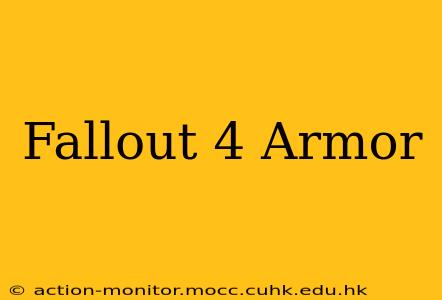Fallout 4, with its vast wasteland and diverse enemies, necessitates a robust defense system. Armor plays a crucial role in player survival, offering protection against ballistic damage, energy attacks, and even radiation. This guide delves into the various types of armor available, their strengths and weaknesses, and how to effectively utilize them.
Types of Armor
Fallout 4 features a wide array of armor, each with its unique attributes. These can broadly be categorized as follows:
Combat Armor:
This is a staple of the Fallout universe, providing excellent all-around protection. Different variations exist, such as the T-45d, T-51b, and X-01 power armor, each offering increased protection and unique modifications. Combat armor often requires significant resources to repair and upgrade.
Leather Armor:
A lighter alternative to combat armor, leather armor offers less protection but greater mobility. This makes it suitable for stealth builds or characters focusing on agility and speed. It is often easily acquired early in the game but may become less effective at higher levels.
Metal Armor:
Metal armor provides a balance between protection and mobility. While not as robust as combat armor, it still offers solid defense against various threats. Various types of metal armor exist, offering slightly different stats and appearances.
Power Armor:
Power armor stands apart as the ultimate form of protection in Fallout 4. Offering exceptional durability and defense against even the most formidable enemies, power armor is a valuable asset. However, it comes with limitations: it requires fusion cores for power, reduces mobility, and can be quite cumbersome.
Modifying Armor
One of the key features of Fallout 4's armor system is its customization. Players can modify their armor at various workbenches to improve its stats and add unique perks. These modifications can include:
- Improved Materials: Replacing standard materials with stronger ones, such as ballistic weave or reinforced plating.
- Added Components: Attaching components like ballistic fiber, reinforced plating, or even energy-resistant layers.
- Weapon Mounts: Integrating weapons directly into the armor, such as missile launchers or miniguns.
Choosing the Right Armor
The choice of armor depends heavily on your playstyle and the challenges you face. A stealth character might prefer lighter leather armor, while a heavy weapons specialist would benefit from the robust protection of combat or power armor. Experimentation and strategic modification are crucial for optimal performance.
Beyond the Basics
This guide provides a basic overview of Fallout 4's armor system. The intricacies of armor modification and the various unique armor pieces found throughout the game offer ample opportunities for experimentation and strategic optimization. Exploring and mastering this system is key to surviving the dangers of the Commonwealth.
